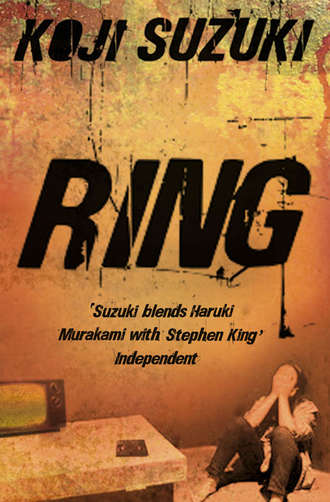
Полная версия
The Complete Ring Trilogy: Ring, Spiral, Loop
Yoshino stood up. “All right. Let’s go next door and talk over a cup of tea or something.”
“Do you have time for this right now? Are you sure I’m not interrupting?”
“Not a problem. This is more interesting than what I was doing.”
There was a little cafe right next to City Hall where you could get coffee for two hundred yen a cup. Yoshino sat down and immediately turned to the counter and called out, “Two coffees.” Then, turning back to Asakawa, he hunched over, leaning close. “Okay, look, I’ve been on the local beat for 12 years now. I’ve seen a lot of things. But. Never have I come across anything as downright odd as this.”
Yoshino paused for a sip of water, then continued. “Now, Asakawa. This has got to be a fair trade of information. Why is someone from the main office looking into this?”
Asakawa wasn’t ready to tip his hand. He wanted to keep the scoop for himself. If an expert like Yoshino caught wind of it, in a heartbeat he’d chase and nab the prize for himself. Asakawa promptly came up with a lie.
“No special reason. My niece was a friend of the dead girl, and she keeps badgering me for information—you know, about the incident. So as long as I was down here …”
It was a poor lie. He thought he saw Yoshino’s eyes flash with suspicion, and he shrank back, unnerved.
“Really?”
“Yeah, well, she’s a high school student, right? It’s bad enough that her friend’s dead, but then there are the circumstances. She just keeps bugging me about it. I’m begging you. Give me details.”
“So, what do you want to know?”
“Did they ever decide on the cause of death?”
Yoshino shook his head. “Basically, they’re saying their hearts just stopped all of a sudden. They have no idea why.”
“How about the murder angle? Strangulation, for example.”
“Impossible. No bruise marks on the neck.”
“Drugs?”
“No traces in the autopsy.”
“In other words, the case hasn’t been solved.”
“Shit, no. No solving to be done. It isn’t a murder—it’s not even an incident, really. They died of some illness, or from some kind of accident, and that’s all there is to it. Period. There’s not even an investigation.”
It was a blunt way of putting it. Yoshino leaned back in his chair.
“So why haven’t they released the names of the deceased?”
“They’re minors. Plus, there’s the suspicion that it was a love suicide.”
At this point Yoshino suddenly smiled, as if he’d just remembered something, and he leaned forward again.
“You know, the guy? He had his jeans and his briefs down around his knees. The girl, too—her panties were pulled down to her knees.”
“So, you mean it was coitus interruptus?”
“I didn’t say they were doing it. They were just getting ready to do it. They were just getting ready to have a little fun and, bam! That’s when it happened,” Yoshino clapped his hands together for effect.
“When what happened?”
Yoshino was telling his story for maximum effect.
“Okay, Asakawa, level with me. You’ve got something. I mean, something that connects with this case. Right?”
Asakawa didn’t reply.
“I can keep a secret. I won’t steal your scoop, either. It’s just that I’m interested in this.”
Asakawa still remained silent.
“Are you gonna keep me hanging here in suspense?”
Should I tell …? But I can’t. I mustn’t say anything yet. But lies aren’t working …
“Sorry, Yoshino. Could you wait just a little longer? I can’t tell you quite yet. But I will in two or three days. I promise.”
Disappointment clouded Yoshino’s face. “If you say so, pal …”
Asakawa gave him a pleading look, urging him to continue his story.
“Well, we’ve got to assume that something happened. A guy and a gal suffocate just when they’re getting ready to do it? That’s not even funny. I guess it’s possible that they’d taken poison earlier and it had only taken effect just then, but there were no traces. Sure, there are poisons that leave no trace, but you can’t figure on a couple of students getting their hands on something like that.”
Yoshino thought of the place where the car had been found. He’d actually gone there himself and still had a clear impression. The car was parked on an overgrown piece of vacant land in a little ravine just off the unpaved prefectural road that led from Ashina to Mt Okusu. Cars coming up the road could just catch the reflection of its taillights as they passed. It wasn’t hard to imagine why the prep school kid, who’d been driving, had chosen this place to park in. After nightfall hardly any cars used this road, and with the thick growth of trees providing cover, it made for a perfect hideaway for a penniless young couple.
“Then, you’ve got the guy with his head jammed up against the steering wheel and the side window. Meanwhile, the girl’s got her head buried between the passenger seat and the door. That’s how they died. I saw them being taken out of the car, with my own eyes. Each body came tumbling out the moment the doors were opened. It’s like at the moment of death some sort of force had been pushing them from the inside, didn’t stop when they died but kept pushing for thirty hours or so until the investigators opened the doors, and then burst out. Now, are you with me here? This car was a two-door, one of those where you can’t lock the doors with the key still inside. And the key was in the ignition, but the doors … well, you catch my drift. The car was completely sealed. It’s hard to imagine that any force from the outside could have affected them. And what kind of expression do you suppose they had on their dead faces? They were both scared shitless. Faces contorted with terror.”
Yoshino paused to catch his breath. There was a loud gulping sound. It wasn’t clear which of them had swallowed his saliva.
“Think about it. Suppose, just for the hell of it, that some fearsome beast had come out of the woods. They’d have been scared, and they would have huddled close to each other. Even if he hadn’t, the girl would absolutely have clung to him. After all, they were lovers. But instead, their backs were pressed up against the doors, as if they were trying to get as far away from each other as they could.”
Yoshino threw up his hands in a gesture of surrender. “Beats the hell out of me.”
If it hadn’t been for the shipwreck in the waters off Yokosuka, the article might have been given more space. And if it had, there would have been a lot of readers who would have enjoyed trying to solve the puzzle, playing detective. But … But. A consensus had spread, an atmosphere, among the investigators and everybody else who had been at the scene. They all thought more or less the same thing, and all of them were on the verge of blurting it out, but nobody actually did. That kind of consensus. Even though it was completely impossible for two young people to die of heart attacks at exactly the same moment, even though none of them really believed it, everybody told themselves the medical lie that it had happened just like that. It wasn’t that people refrained from saying anything out of fear of being laughed at for being unscientific. It was that they felt they’d be drawing unto themselves some unimaginable horror by admitting it. It was more convenient to indulge in the scientific explanation, no matter how unconvincing it was.
A chill ran up Asakawa’s spine and Yoshino’s simultaneously. Unsurprisingly, they were both thinking the same thing. The silence only confirmed the premonition which was welling up in each man’s breast. It’s not over—it’s only just started. No matter how much scientific knowledge they fill themselves with, on a very basic level, people believe in the existence of something that the laws of science can’t explain.
“When they were discovered … where were their hands?” Asakawa suddenly asked.
“On their heads. Or, well, it was more like they were covering their faces with their hands.”
“Were they by any chance pulling at their hair, like this?” Asakawa tugged at his own hair to demonstrate.
“Eh?”
“In other words, were they tearing at their heads, or pulling out their hair, or anything like that?”
“No. I don’t think so.”
“I see. Could I get their names and addresses, Yoshino?”
“Sure. But don’t forget your promise.”
Asakawa smiled and nodded, and Yoshino got up. As he stood the table swayed and their coffee spilled into their saucers. Yoshino hadn’t even touched his.
5
Asakawa kept investigating the four victims’ backgrounds whenever he had a free minute, but had so much work to do that he wasn’t getting as far as he’d hoped. Before he knew it a week had passed, it was a new month, and both August’s rain-soaked humidity and September’s summery heat became distant memories pushed aside by the signs of deepening autumn. Nothing happened for a while. He’d been making a point of reading every inch of the local-news pages, but without coming across anything remotely similar. Or was it just that something horrible was advancing, slowly but surely, where Asakawa couldn’t see? But the more time elapsed, the more inclined he was to think that the four deaths were just coincidences, unconnected in any way. He hadn’t seen Yoshino since then, either. He had probably forgotten the whole thing, too. If he hadn’t, he would have contacted Asakawa by now.
Whenever his passion for the case showed signs of waning, Asakawa would take four cards out from his pocket and be reminded once again that it couldn’t have been a coincidence. On the cards he’d written the deceased’s names, addresses, and other pertinent information, and on the remaining space he planned to record their activities during the months of August and September, their upbringing, and anything else his research turned up.
CARD 1:
TOMOKO OISHI
Date of birth: 10/21/72
Keisei School for Girls, senior, age 17
Address: 1-7 Motomachi, Honmoku, Naka Ward, Yokohama
Approx. 11 pm, Sept. 5: dies in kitchen on first floor of home, parents away. Cause of death sudden heart failure.
CARD 2:
SHUICHI IWATA
Date of birth: 5/26/71
Eishin Preparatory Academy, first year, age 19
Address: 1-5-23 Nishi Nakanobu, Shinagawa Ward, Tokyo
10:54 pm, Sept. 5: falls over and dies at intersection in front of Shinagawa Sta. Cause of death cardiac infarction.
CARD 3:
HARUKO TSUJI
Date of birth: 1/12/73
Keisei School for Girls, senior, age 17
Address: 5-19 Mori, Isogo Ward, Yokohama
Late night, Sept. 5 (or early next morning): dies in car off pref. road at foot of Mt Okusu. Cause of death sudden heart failure.
CARD 4:
TAKEHIKO NOMI
Date of birth: 12/4/70
Eishin Preparatory Academy, second year, age 19 Address: 1-10-4 Uehara, Shibuya Ward, Tokyo
Late night, Sept. 5 (or early next morning): dies w/Haruko Tsuji in car at foot of Mt Okusu. Cause of death sudden heart failure.
Tomoko Oishi and Haruko Tsuji went to the same high school and were friends; Shuichi Iwata and Takehiko Nomi studied at the same prep school and were friends: this much had been clear prior to legwork, which indeed confirmed it. And from the simple fact that Tsuji and Nomi had gone for a drive together on Mt Okusu in Yokosuka on the night of September 5th, it was obvious that they were, if not quite lovers, at least fooling around. When he’d asked her friends, he’d heard the rumor that Tsuji had been dating a prep school guy from Tokyo. However, Asakawa still didn’t know when or how they’d met. Naturally, he suspected that Oishi and Iwata were going out, too, but he couldn’t find anything to back this up. It was equally possible that Oishi and Iwata had never even seen each other. In which case, what was there to link these four? They seemed far too closely related for this unknown being to have picked them totally at random. Maybe there was some secret that only the four of them knew, and they’d been killed for it … Asakawa tried out a more scientific explanation with himself: perhaps the four of them had been in the same place at the same time, and all four had been infected with a virus that attacks the heart.
Hey, now. Asakawa shook his head as he walked. A virus that causes sudden heart failure? Come on.
He climbed the stairs, muttering to himself, a virus, a virus. Indeed, he should start out with attempts at scientific explanation. Well, suppose there was a virus that caused heart attacks. At least it was a little more realistic than imagining that something supernatural was behind it all; it seemed less likely to get him laughed at. Even if such a virus hadn’t yet been discovered on earth, maybe it had just recently fallen to earth inside a meteor. Or maybe it had been developed as a biological weapon and had somehow escaped. You couldn’t rule out the possibility. Sure. He’d try thinking of it as a kind of virus for a while. Not that this would satisfy all his doubts. Why had they all died with looks of astonishment on their faces? Why had Tsuji and Nomi died on opposite sides of that small car, as if they were trying to get away from each other? Why hadn’t the autopsies revealed anything? The possibility of an escaped germ weapon could at least answer the third question. There would have been a gag order.
If he were to pursue this hypothesis further, he could deduce that the fact that there hadn’t been any other victims yet meant that the virus was not airborne. It was either blood-borne, like AIDS, or was fairly noncontagious. But more importantly, where had these four picked it up? He’d have to go back and sift through their activities in August and September again and look for places and times they had in common. Since the participants’ mouths had been shut permanently, it wouldn’t be easy. If their meeting had been a secret among the four of them, something neither parents nor friends knew about, then how was he to ferret it out? But he was sure that these four kids had some time, some place, some thing in common.
Sitting down at his word processor Asakawa chased the unknown virus from his thoughts. He needed to get out the notes he’d just taken, to sum up the contents of the cassette he’d made. He had to get this article finished today. Tomorrow, Sunday, he and his wife Shizu were going to visit her sister, Yoshimi Oishi. He wanted to see with his own eyes the spot where Tomoko had died, to feel on his own flesh whatever air still lingered. His wife had agreed to go to Honmoku to console her bereaved older sister; she had no inkling of her husband’s true motives.
Asakawa started pounding the keys of the word processor before he’d come up with a decent outline.
6
Shizu was seeing her parents for the first time in a month. Ever since their granddaughter Tomoko had died, they came to Tokyo from their home in Ashikaga whenever they could, not only to console their daughter but to be consoled in turn. Shizu only understood this today. Her heart ached when she saw her aged parents’ thin, grief-stricken faces. They had once had three grandchildren: their oldest daughter Yoshimi’s daughter Tomoko, their second daughter Kazuko’s son Kenichi, and Shizu’s daughter Yoko. One grandchild from each of their three daughters—not all that common. Tomoko had been their first grandchild, and their faces had crinkled up every time they had seen her; they had enjoyed spoiling her. Now they were so depressed that it was impossible to say whose grief was deeper, the parents’ or the grandparents’.
I guess grandchildren really mean a lot.
Shizu had just turned thirty this year. It was all she could do to imagine what her sister must be feeling, putting herself in her sister’s place, contemplating how she’d feel if she lost her own child. But really, there was no comparison to be made between her daughter Yoko, only a year and a half old, and Tomoko, who had died at seventeen. She couldn’t fathom how every passing year would deepen her love for her child.
Sometime after three in the afternoon, her parents began to get ready to go home to Ashikaga.
Shizu could hardly contain her surprise. Why had her husband, who always protested that he was too busy, suggested this visit to her sister’s house? This was the same husband who’d skipped the poor girl’s funeral, pleading that he had a deadline to meet. And now here it was almost dinnertime, and he wasn’t showing the slightest inclination of leaving. He’d only met Tomoko a few times, and had probably never talked with her for very long. Surely he wasn’t feeling detained by memories of the deceased.
Shizu tapped Asakawa lightly on the knee and whispered in his ear, “Dear, it’s probably about time …”
“Look at Yoko. She’s sleepy. Maybe we ought to see if we could let her take a nap here.”
They had brought their daughter. Normally, this was nap time. Sure enough, Yoko had started blinking like she did when she was sleepy. But if they let her sleep here, they’d have to stay in this house for at least two more hours. What would they find to talk about with her grieving sister and her husband for two more hours?
“She can sleep on the train, don’t you think?” said Shizu, dropping her voice.
“Last time we tried that she got fussy, and it was awful all the way home. No, thanks.”
Whenever Yoko got sleepy in a crowd, she got unbelievably fidgety. She’d flail her little arms and legs, wail at the top of her lungs, and just generally make life difficult for her parents. Scolding her only made it worse—there was no way to calm her down except to try to get her to sleep. At times like that Asakawa became intensely conscious of the looks of people around him, and he’d start sulking himself, as though he were the prime victim of his daughter’s shrieking. The accusing stares of the other passengers always made him feel like he was choking.
Shizu preferred not to see her husband in that state, with his cheeks twitching nervously and all. “All right, then, if you say so.”
“Great. Let’s see if she’ll take a nap upstairs.”
Yoko lay in her mother’s lap, eyes half closed.
“I’ll go put her down,” he said, caressing his daughter’s cheek with the back of his hand. The words sounded strange coming from Asakawa, who hardly ever helped with the baby. Maybe he’d had a change of heart, now that he’d witnessed the sorrow of parents who’d lost a child.
“What’s come over you today? It’s spooky.”
“Don’t worry. She looks like she’ll go right down. Leave it to me.”
Shizu handed the child over. “Thanks. I just wish you were like this all the time.”
As she was transferred from her mother’s bosom to her father’s, Yoko began to scrunch up her face, but before she had time to follow through she had fallen asleep. Asakawa climbed the stairs, cradling his daughter. The second floor consisted of two Japanese-style rooms and the Western-style room which had been Tomoko’s. He laid Yoko on the futon in the Japanese-style room that faced south. He didn’t even need to stay with her as she fell asleep. She was already out, her breathing regular.
Asakawa slipped out of the room and listened to see what was going on downstairs, and then entered Tomoko’s bedroom. He felt a little guilty about invading a dead girl’s privacy. Wasn’t this the kind of thing he abhorred? But it was for a good cause—defeating evil. There was nothing but to do it. Even as he thought this, he hated the way he was always willing to seize on any reason, no matter how specious, in order to rationalize his actions. But, he protested, it wasn’t like he was writing an article about it: he was just trying to figure out when and where the four had been together. Sorry.
He opened her desk drawers. Just the normal assortment of stationery supplies, like any high school girl would have, rather neatly arranged. Three snapshots, a junk box, letters, a notepad, a sewing kit. Had her parents gone through here after she died? It didn’t look like it. Probably she was just naturally neat. He was hoping to find a diary—it would save him a lot of time. Today I got together with Haruko Tsuji, Takehiko Nomi, and Shuichi Iwata, and we … If he could just find an entry like that. He took a notebook from her bookshelf and flipped through it. He actually came across a very girlish diary in the back of a drawer, but there were only a few desultory entries on the first few pages, all of them dated long ago.
On the shelf beside the desk there were no books, only a red flowered makeup stand. He opened the drawer. A bunch of cheap accessories. A lot of mismatched earrings—it seemed she had a habit of losing one of every pair she owned. A pocket comb with several slender black strands of hair still wrapped around it.
Opening the built-in wardrobe, his nose was assailed by the scent of high school girls. It was packed tight with colorful dresses and skirts on hangers. His sister-in-law and her husband had obviously not figured out what to do with these clothes, which still carried their daughter’s fragrance. Asakawa pricked up his ears at what was going on downstairs. He wasn’t sure what they’d think if they caught him in here. There was no sound. His wife and her sister must still be talking about something. Asakawa searched the pockets of the clothes in the wardrobe one by one. Handkerchiefs, movie ticket stubs, gum wrappers, napkins, commuter pass case. He examined it: a pass for the stretch between Yamate and Tsurumi, a student ID card, and a membership card. There was a name written on the membership card: Something-or-other Nonoyama. He wasn’t sure how to pronounce the characters for the first name—Yuki, maybe? From the characters alone he couldn’t tell if it was a man or a woman. Why did she have someone else’s card in her pass case? He heard footsteps coming up the stairs. He slipped the card into his pocket, put the case back where he’d found it, and shut the wardrobe. He stepped into the hall just as his sister-in-law reached the top of the stairs.
“Sorry, is there a bathroom up here?” He made a show of acting antsy.
“It’s there at the end of the hall.” She didn’t seem to suspect anything. “Is Yoko sleeping like a good girl?”
“Yes, thanks. Sorry to put you to such trouble.”
“Oh no, not at all.” The sister-in-law bowed slightly, then stepped into the Japanese-style room, hand on her kimono sash.
In the bathroom, Asakawa took out the card. “Pacific Resorts Club Member’s Card” it read. Underneath this was Nonoyama’s name and membership number and the expiration date. He flipped it over. Five membership conditions, in fine print, plus the name of the company and its address. Pacific Resorts Club, Inc., 3-5 Kojimachi, Chiyoda Ward, Tokyo. Phone no. (03) 261-4922. If it wasn’t something she’d found or swiped, Tomoko must have borrowed this card from this Nonoyama person. Why? To use Pacific Resorts facilities, of course. Which one, and when?
He couldn’t call from the house. Saying he was going to go buy cigarettes, he ran to a pay phone. He dialed the number.
“Hello, Pacific Resorts, may I help you?” A young woman’s voice.
“I’d like to know what facilities I can use with a membership card.”
The voice didn’t respond right away. Maybe they had so many facilities available that she couldn’t just list them all.
“That is … I mean … for example, like on an overnight trip from Tokyo,” he added. It would have stood out if the four of them had gone away for two or three nights together. The fact that he hadn’t turned anything up so far meant that they had probably gone for no longer than a single night. She could easily get away for a single night by lying to her parents that she was staying at a friend’s house.
“We have a full range of facilities at our Pacific Land in South Hakone,” she said, in her businesslike manner.
“Specifically, what sorts of leisure activities do you have there?”






